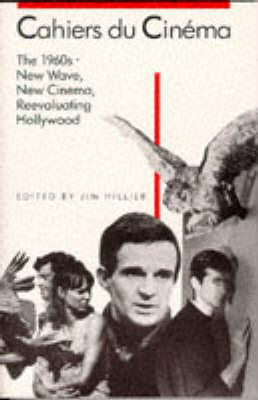
Stock image for illustration purposes only - book cover, edition or condition may vary.
Cahiers du Cinema: 1960-1968: New Wave, New Cinema, Reevaluating Hollywood
Jim Hillier (Ed.)
€ 49.60
FREE Delivery in Ireland
Description for Cahiers du Cinema: 1960-1968: New Wave, New Cinema, Reevaluating Hollywood
Paperback. Providing an understanding of the important changes that took place in cinema and film criticism in the 1960s and beyond, this book looks at the French film journal "Cahiers du Cinema" and its contribution to the new directions in film-making and film criticism which began in the 1960s. Series: Harvard Film Studies. Num Pages: 384 pages, index of names and film titles. BIC Classification: 1KBB; APFA. Category: (G) General (US: Trade); (P) Professional & Vocational; (UP) Postgraduate, Research & Scholarly; (UU) Undergraduate. Dimension: 235 x 156 x 24. Weight in Grams: 562.
In the turbulent sixties, the provocative French film journal Cahiers du Cinema was at its most influential and controversial. The first successes of the New Wave by major Cahiers contributors such as Jean-Luc Godard, Francois Truffaut, Jacques Rivette, Eric Rohmer, and Claude Chabrol focused international attention on the revitalization of French cinema and its relation to film criticism; and in the early 1960s the journal's laudatory critiques of popular American movies were attaining the greatest notoriety. As the lively articles, interviews, and polemical discussions in this volume reveal, the 1960s saw the beginnings of significant new directions in filmmaking and film criticism changes in which the New Wave itself was a major factor. The auteur theory that the journal had championed in the 1950s began to be rethought and revalued. At the same time, along with a reassessment of American film, Cahiers began to embrace new, often oppositional forms of cinema and criticism, culminating in the political and aesthetic radicalism of the ensuing decade. The selections, translated under the supervision of the British Film Institute, are annotated by Jim Hillier, and context is provided in his general introduction and part introductions. For an understanding of the important changes that took place in cinema and film criticism in the 1960s and beyond, this book is essential reading.
Product Details
Publisher
Harvard University Press United States
Number of pages
384
Format
Paperback
Publication date
1992
Series
Harvard Film Studies
Condition
New
Weight
561g
Number of Pages
384
Place of Publication
Cambridge, Mass, United States
ISBN
9780674090651
SKU
V9780674090651
Shipping Time
Usually ships in 15 to 20 working days
Ref
99-14
About Jim Hillier (Ed.)
Jim Hillier is Senior Lecturer in Film Studies, Bulmershe College of Higher Education, Reading, England.
Reviews for Cahiers du Cinema: 1960-1968: New Wave, New Cinema, Reevaluating Hollywood
This isn't simply an anthology of interesting film criticism; it's something much more rare and intriguing
the documentary history of an important intellectual shift...The principles discovered by the Cahiers writers and developed by themselves and others irreversibly altered the way movies were seen...By treating movies as movies, not as poor relations to books or plays, the Cahiers critics helped introduce a new art form to the century that produced it. New York Times Book Review Wonderfully intellectual and anti-academic at the same time, the articles are, more than anything else, supremely personal...These are immensely serious people, self-consciously bent on nothing less than changing the history of cinema. In important ways they first taught us how to look at movies, especially our own. American Film
the documentary history of an important intellectual shift...The principles discovered by the Cahiers writers and developed by themselves and others irreversibly altered the way movies were seen...By treating movies as movies, not as poor relations to books or plays, the Cahiers critics helped introduce a new art form to the century that produced it. New York Times Book Review Wonderfully intellectual and anti-academic at the same time, the articles are, more than anything else, supremely personal...These are immensely serious people, self-consciously bent on nothing less than changing the history of cinema. In important ways they first taught us how to look at movies, especially our own. American Film
